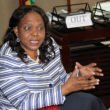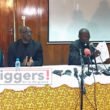The three Church Mother Bodies say they will endeavour to reconcile President Edgar Lungu with his political arch rival Hakainde Hichilema of the UPND without any bloodshed, like they did with Dr Kenneth Kaunda and Frederick Chiluba in 1991.
And in a joint communique signed by ZCCB president, Bishop Zumaile Lungu, CCZ president Bishop Alfred Kalembo, and EFZ Board Chairperson Bishop Paul Mususu, the Church Mother Bodies stated that the root causes of the social, economic problems emanate from disunity and the blatant lack of political will by leaders to address violence.
“We, the leaders of the three Church Mother Bodies in Zambia, namely: the Council of Churches in Zambia (CCZ), the Evangelical Fellowship of Zambia (EFZ) and the Zambia Conference of Catholic Bishops (ZCCB), are aware that, immense expectations and trust by the people, have been put on the Church in Zambia to lead the much talked-about dialogue and reconciliation process, and that the nation is going through a difficult period economically, socially and politically, and that some of the root causes of the social, economic problems emanate from disunity, continued state of political tension and the blatant lack of political will by our leaders to address the root causes of what is obtaining, and that many public pronouncements have been made by various stakeholders regarding this dialogue process and how it should be moved forward. However, we refuse to be drawn into the discourse of who should lead the process and which other religious organisations should be part and parcel of the leadership in facilitating the dialogue and reconciliation,” the Church Mother Bodies stated.
“We are confident that we can draw valuable lessons from our historical success in 1991, when we, the three Church Mother Bodies, brought Dr Kenneth Kaunda of UNIP and Dr Fredrick Chiluba of MMD to a roundtable dialogue meeting at the Cathedral of the Holy Cross, which resulted into Zambia welcoming the multiparty dispensation in a peaceful manner without bloodshed. We also believe that we can learn from the recent past in which our political leaders failed to abide by what was agreed upon during the Inter-Party Dialogue meeting held at the Cathedral of the Holy Cross on 29th March, 2016, which we organised in order to respond to the many electoral and human rights issues that were troubling the nation.”
The Church, however, stated that it had taken the responsibility of leading the dialogue process as a ‘calling from God’ to reconcile the nation in order to bring peace and harmony.
“We consider reconciliation as our duty, given to us by God, in exercising our mandate in the prophetic mission of the Church. We are reminded of what St Paul wrote to the Corinthians: 16 ‘From now on, therefore, we regard no one, according to the flesh, even though we once regarded Christ according to the flesh, we regard him thus no longer. 17: Therefore, if anyone is in Christ, he is a new creation. The old has passed away; behold, the new has come. 18: All this is from God, who through Christ reconciled us to himself and gave us the ministry of reconciliation” (2 Corinthians 5:16-18)’. Thus, we take the responsibility of leading this dialogue process as a calling from God to reconcile the nation in order to bring peace and harmony among God’s children in Zambia. In so doing, we neither seek political mileage nor publicity,” the Church further stated.
And the Church has hoped for a serious commitment from all stakeholders ahead of the dialogue process.
“We further believe that the peace accord brokered in that dialogue meeting should have marked a new beginning. However, as you are all aware, our leaders across the political divide, failed to abide by the very commitments they made to end political violence, misapplication of the Public Order Act and electoral corruption. Because of this failure, the country is in this state of political division and socio-economic decline. We, therefore, resolve to continue the work of preparing a clear roadmap for a genuine process of dialogue that will be Zambian-owned and driven and will be aimed at national reconciliation. As we indicated in our joint statement of 8th January, 2018, ‘true dialogue means a change of heart, attitude and behaviour’. It is a project, an ongoing process and effort. It is the way of life for us Christians, which should be heard in our words, seen in our faces and actions because it is in our hearts,” advised the Church.
“We look forward to serious commitment from all stakeholders in this process as we call upon them to remain focused and avoid political expediency that may derail the entire process. We, on our part, are full of hope for a successful process and remain committed to carry out this mandate entrusted to us by the Zambian people, and with the help of ALL well-meaning Zambians and the mighty hand of God, Zambia will be set on a new trajectory that will ensure that we truly live in peace, unity and harmony by promoting a culture of true dialogue, good governance.”












